[ad_1]
For a lot of preppers, livestock types a key a part of their long-term survival plans.
Cabinets of canned meals and a stash of home-made jerky will probably be a giant assist in getting via the weeks and months after a disaster hits, however in the long run in order for you contemporary meat you’re both going to should hunt for it or rear it your self.
For different issues – milk and eggs, for instance, or wool in case you plan on making your individual yarn – holding livestock is the one actual possibility.
In fact, simply a few generations in the past a whole lot of our ancestors didn’t see livestock as an emergency useful resource; it was a part of their every day lives. My very own grandparents went via wartime rationing within the UK, and that was powerful.
Meat, notably, was tightly rationed. The weekly ration per individual throughout WWII included one shilling and two pence price of meat, which often labored out to a couple of pound and 1 / 4, plus 4 ounces of bacon or ham.
Some meats, like sausages or offal, weren’t rationed; they had been simply nearly unimaginable to search out, as a result of provide by no means got here near maintaining with demand.
In the meantime in case you acquired one egg every week you had been fortunate, besides kids and pregnant ladies who acquired three. Cheese? You would have two ounces every week, and one other two ounces of butter.
Most individuals couldn’t maintain a cow, or spend the time to make their very own cheese and butter, however with meat and eggs in such quick provide there have been many who noticed the worth of getting some livestock.
Associated: The best way to Make Clarified Butter With 12-Month Shelf Life
Not all of them had been rural folks both; actually tens of millions of properties in British cities and cities boosted their rations by holding some animals. Clearly in case you did reside in a rural space, and had extra space obtainable, you had extra choices – however even in a metropolis house it was potential to boost some meat.
Chickens
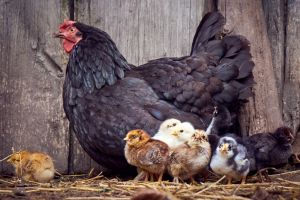 One in all my great-grandparents was a hen farmer, however that was on an industrial scale; he had row after row of sheds, containing 1000’s of birds.
One in all my great-grandparents was a hen farmer, however that was on an industrial scale; he had row after row of sheds, containing 1000’s of birds.
My grandparents’ era went in for chickens in a a lot smaller approach. Just a few chickens didn’t take a lot time or effort however made an actual distinction to their eating regimen.
These days, chickens largely eat meals pellets – however the reality is that they’ll eat nearly something. If they will wander in a yard, they’ll peck on the floor searching for bugs and worms.
They’ll eat seeds, small crops and even small animals. You possibly can feed them most kitchen scraps. They do want grains of their diets to remain wholesome, however feeding them isn’t a giant expense – they usually’ll greater than repay it.
When eggs had been rationed to 1 every week at most (in 1944 the typical British civilian acquired about 30 eggs on the ration via the entire yr) having chickens at handmade an enormous distinction.
Relying on breed, eating regimen, and season, a hen can lay wherever from one or two eggs every week to 300 a yr – nearly one each day. A single hen may present ten instances the egg ration. In the event that they fed the chickens this plant, it made them lay at the very least twice as many eggs as typical. And naturally, when a hen stopped laying, it will be killed for meat.
Rabbits
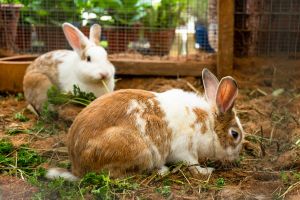 Rabbit meat has gone out of style within the US, however some folks nonetheless eat it – and a few generations in the past many extra did. Throughout WWII there was a surge in rabbit-keeping within the UK.
Rabbit meat has gone out of style within the US, however some folks nonetheless eat it – and a few generations in the past many extra did. Throughout WWII there was a surge in rabbit-keeping within the UK.
Even chickens want at the very least a small yard, however house residents would usually mount rabbit hutches outdoors their home windows.
Like chickens, rabbits are low cost to feed. They’ll eat kitchen scraps like vegetable peelings, and their eating regimen may very well be bulked out with just about any leafy greenery.
Some foraging for weeds within the native park, and even round bombed-out buildings, would supply a lot meals for just a few rabbits, they usually’re fast-growing.
A child rabbit will develop to maturity in as little as six to eight months for a meat-producing breed. One other good thing about rabbits as livestock is that they’re notoriously environment friendly at reproducing, so in case you begin off with two of them you’ll have a kind of countless provide of rabbit meat.
Pigeons
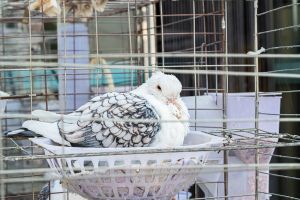 When you see a pigeon shed in somebody’s yard you’re more likely to assume they breed racing pigeons – however they may truly be elevating them for meat and eggs.
When you see a pigeon shed in somebody’s yard you’re more likely to assume they breed racing pigeons – however they may truly be elevating them for meat and eggs.
They don’t produce wherever close to as many eggs as chickens do (often two at a time, as much as eight instances a yr) however they’re an environment friendly method to produce low cost meat.
Associated: An Ingenious Approach to Catch Pigeons and Different Birds in Your Personal Yard
Pigeons may be allowed out to forage in the course of the day, they usually’ll return to their shed or loft at evening; they’re mainly self-feeding, which takes away one of many large bills of most livestock.
Child pigeons, known as “squabs”, will develop as large as their mother and father in simply two months and are an amazing supply of tender contemporary meat.
Pigs
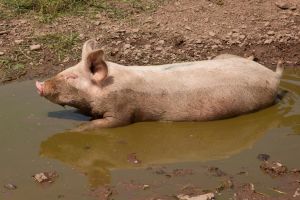 Pigs are somewhat more durable to boost than chickens, rabbits or pigeons.
Pigs are somewhat more durable to boost than chickens, rabbits or pigeons.
You’re undoubtedly not going to maintain one in an house. Not like smaller animals, it wants a yard with sufficient house to roam free.
They’re amazingly environment friendly at changing kitchen scraps into protein.
In case you have sufficient land to allow them to forage, they’ll fortunately eat grass, different crops, worms and small animals.
Pigs are omnivores and wish a balanced eating regimen, however you may feed them fairly cheaply; in return you’ll get a whole lot of meat.
Slaughtering and processing a pig generally is a large job, although. Nevertheless, you may study right here the best technique for butchering and preserving a pig for an entire yr with out refrigeration, simply as my grandparents used to do.
Sheep
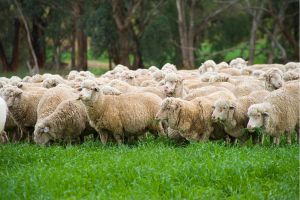 For nation folks with a little bit of land, together with my grandmother, sheep had been an possibility.
For nation folks with a little bit of land, together with my grandmother, sheep had been an possibility.
Like pigeons they’re mainly self-feeding.
Flip them free on a sufficiently big patch of grass they usually’ll simply wander round all of it day grazing.
They’re hardy animals too, in a position to survive moist or chilly climate because of their thick wool coats.
Outdoors of lambing season, all it’s important to do is shield them from predators and ensure their grazing land is enclosed so that they don’t get lost or blunder into any hazards – they’re not the neatest of creatures, and have a knack for getting misplaced or caught.
Yearly a sheep may have one or two lambs, which may be slaughtered for meat once they’re three to 4 months previous.
Retaining livestock doesn’t should be time-consuming or costly – and it doesn’t want a whole lot of land, both.
Our ancestors selected the animals that labored of their private circumstances, whether or not that was a dozen sheep or a few rabbits in a cage. There’s nothing to cease fashionable preppers doing the identical.
You might also like:
 When Bugging In Can Get You Killed
When Bugging In Can Get You Killed
If You Have This on Your Property, Cover it Instantly (Video)
25 Survival Objects to Hunt for at Flea Markets
These 10 Forms of Folks Will Die First When SHTF
How To Construct Self-Watering Raised Backyard Beds
[ad_2]
Source link




